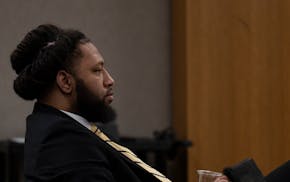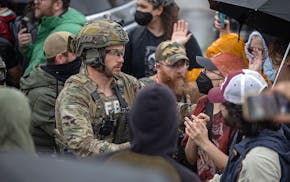When a bill passed the U.S. House last month seeking to overhaul the way Americans register to vote, a narrative emerged that it could bar millions of married women from voting.
The same conversation circulated after President Donald Trump signed a similar executive order in March.
Both the federal bill, called the Safeguard American Voter Eligibility (SAVE) Act, and the executive order would require every American to provide "documentary" proof of citizenship — in person — when registering or re-registering to vote in federal elections.
Documentary proof refers to documents that establish a person's status as a citizen, such as a U.S. passport, a birth certificate, a certificate of citizenship or naturalization papers.
The Trump administration has maintained the change is needed to prevent voting fraud, but the nonpartisan Brennan Center for Justice said the SAVE Act would be an "operational nightmare, an unfunded mandate, and put election officials at legal risk — all for an unnecessary requirement. There are already multiple protections in place to ensure that only eligible U.S. citizens can vote."
How would it affect married women?
Both the bill (should it become law) and the executive order could affect some 69 million married women across the country who changed their names when they wed — women who don't have birth certificates that match their current names, according to the Center for American Progress, a Washington, D.C.-based progressive think tank. These women would likely need additional documentation to vote.
How many married Minnesota women could be affected?
The Minnesota Secretary of State's Office said it doesn't know for sure, but we tried to unearth that number. The Census Bureau's American Community Survey says there are 1.2 million married women in Minnesota. Since the Pew Research Center estimates 79% of married women change their names, that would make for 948,000 Minnesota women who may find it difficult to vote in federal elections under the Republican-led overhaul.
Anyone else potentially affected?
Yes, but again, we don't have exact numbers. It could include transgender people who have changed their names. All told, there are about 26,000 people who identify as transgender in Minnesota, or 0.6% of the state's adult population, according to the Williams Institute, an LGBTQ+ think tank at UCLA.
And then there's 5% of the male population nationwide who took their wife's last name when they married, and men who hyphenated their surnames when they wed, less than 1% of the married population, according to Pew.
This list goes on, including rural residents who live far from government offices to register, as well as students, homeless people and members of the military who move frequently.
What is the current situation for voter registration?
The federal voter registration form asks people to swear ― under penalty of perjury — that they are U.S. citizens and provide a driver's license number, state ID number or Social Security number.
Can't these people just use their U.S. passports to register to vote?
Yes, but 44.6% of Minnesotans, about 2.4 million people, do not have a passport, according to Center for American Progress.
What about Real ID?
In a letter to Congress, more than two dozen secretaries of state said Real IDs that have already been issued would not meet the SAVE Act's requirements for documentary proof of citizenship, since they do not indicate citizenship status. That means the nearly 140 million Real IDs that have been issued over the past decade could not be used as proof of citizenship.
However, a handful of states, including Minnesota, offer a citizen-only Real ID alternative that might meet SAVE Act requirements, according to the Associated Press.
Why would any longstanding voter need to re-register?
Because they've moved, even if only to a town in the same state.
What's the official line from Minnesota Secretary of State Steve Simon?
Simon recently noted that the few states that have tried to do this in the past have regretted it, including Kansas, where a similar law blocked tens of thousands of citizens from registering although they were otherwise eligible to vote. The federal courts ultimately declared the law unconstitutional.
"I understand and agree with making sure that only citizens are voting, but this is a flawed and chaotic way to do it," Simon said.
Simon and 14 other secretaries of state sent a letter to the chair of the House Administration Committee expressing their concerns about the SAVE Act.
Is voter fraud a problem in Minnesota?
Simon points to a recent study by a University of St. Thomas professor who looked at every prosecution related to noncitizen voting in Minnesota since 2015. He found just three convictions out of more than 13 million votes cast.
"Even though I believe it's a clumsy attempt at a federal takeover of aspects of our election system, one that is likely going to be struck down, we have to take seriously what he (Trump) is trying to do," Simon said.
What are others saying?
A spokesperson for the feminist group Women's March Minnesota said the SAVE Act "discourages voters whose current legal name doesn't match their birth certificate, including people who have changed their name due to marriage, gender affirmation or other reasons. There may be ways to waive this exclusion with additional paperwork, but it sets up barriers."
What are supporters saying?
White House Press Secretary Karoline Leavitt said Democrats "have been fearmongering about this bill, have been saying if married women change their name, they would not be able to vote. That is complete fallacy."
How did the Minnesota delegation in the House vote on the SAVE Act?
Along party lines, with Republicans supporting the measure, and Democrats opposing it.
Here's a sampling of what our lawmakers said after the vote:
On social media, Minneapolis DFL Rep. Ilhan Omar called the SAVE Act a "suppression bill" that will "disenfranchise millions of voters, especially married women."
Rep. Pete Stauber, a Republican representing much of northern Minnesota, said in a news release that immigrants entering the country illegally during the Biden administration increased the threat of fraud in elections.
Rep. Michelle Fischbach, a Republican representing parts of western Minnesota, took a swipe at Gov. Tim Walz in her SAVE Act news release, claiming he "has done nothing about the non-citizens that are appearing on voter rolls and receiving election ballots."
What's next?
Republicans in the Senate failed to pass a similar measure last year and pundits say it's unlikely to fare any better this time around.
Briana Bierschbach of the Minnesota Star Tribune contributed to this story.
Minnesota groups call Trump travel ban 'cruel' as they assess its impact on state
What we know about the federal raids across the Twin Cities
Legislators miss own deadline, eye possible weekend special session

In surprise testimony, brother says Derrick Thompson was driving in crash that killed 5 Somali women

